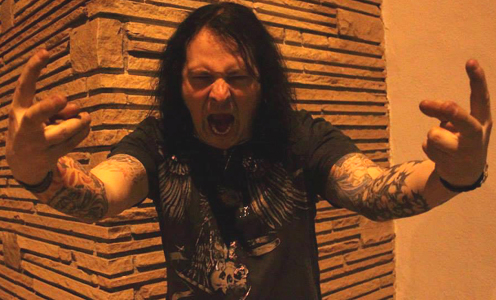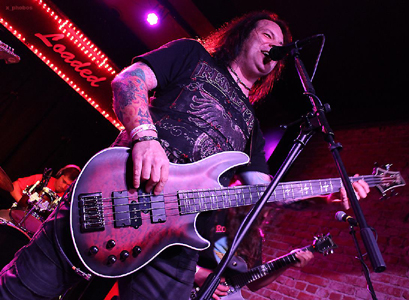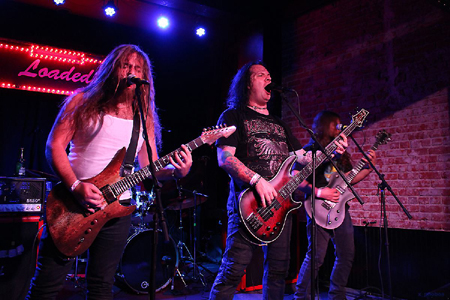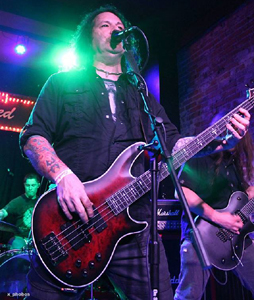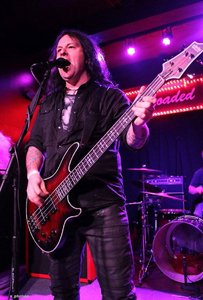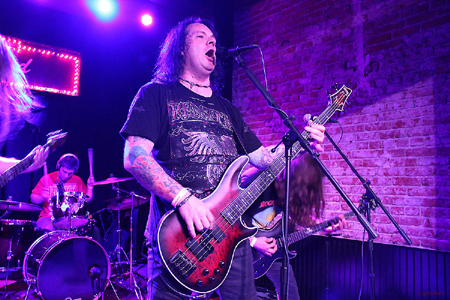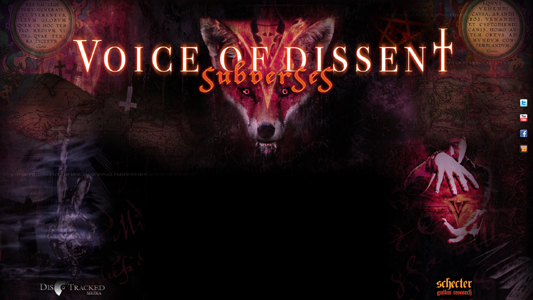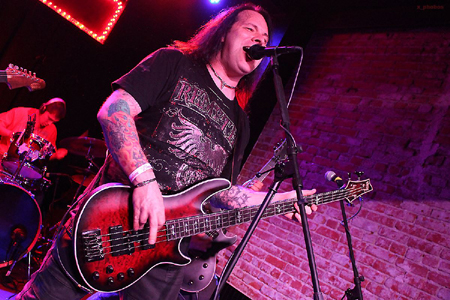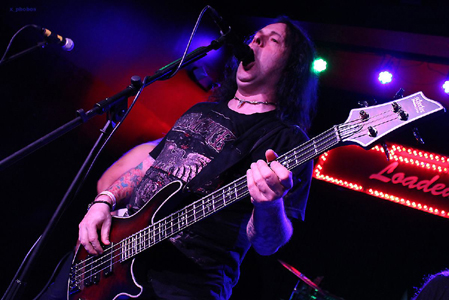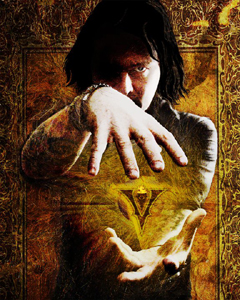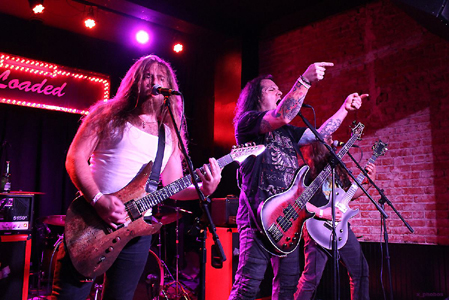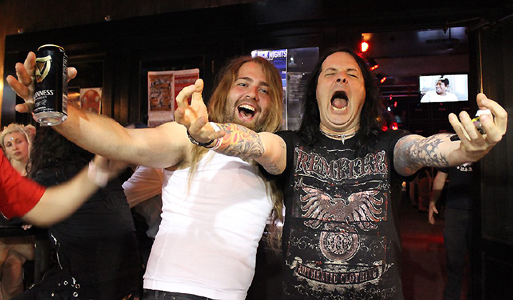|
An Interview with 'Rodney McGlothlin'
Vocalist & Bassist of ‘Voice Of Dessent’ from Hollywood, California that took place late August. Interviewed by Glenn Milligan Glenn: What originally got you interested in music? Rodney: When I was really young I had some much older step brothers who were into classic rock. I got exposed to band like Black Sabbath, Van Halen, Led Zeppelin, Rush, etc, when I was 6 or 7. After that, my father moved a lot and I spent a lot of time on my own and listened to the radio constantly. Music became my best friend and companion for a long time. Glenn: Why did you decide to become a bassist? Rodney: I started playing bass after I first tried guitar, but for some reason, it just didn’t connect right away. The first time I tried a bass it felt like it made sense and I could already play it. I was always fascinated by bassists anyway, so it stuck. Later I picked up guitar again when I wanted to be able to write and record on my own and I’ve come to enjoy playing it as well. Glenn: Out of interest, what was your first guitar, when did you get it and where from? Rodney: From a department store catalog! I hounded my mother for it and got it despite my father’s protests!
Glenn: What was your initial opening to Metal? Rodney: Again, I was first exposed via my brothers early on. I would say later on I got into more obscure styles through friends, trading music, etc. Glenn: What was it about Speed and Thrash Metal that turned you onto it so much as opposed to other genres of Metal? Rodney: I love a lot of genres in metal, but I always seemed to be attracted to the faster songs that even classic metal bands did. There seemed to be an intensity and adrenaline rush. It felt dangerous like it could all fall apart at any moment. I was really attracted to the dangerous feel, and I guess I’m just a crackhead when it comes to tempos! I remember hearing ‘Fight Fire With Fire’ from Metallica for the first time and thinking it was the most intense thing I had ever heard. It was all downhill after that. Glenn: How did the band 'Voice Of Dissent' come to be? Rodney: After being in a number of projects that I just didn’t feel where really doing what I wanted, and struggling to keep bands together with members being inconsistent, or just not driven enough, I decided to really get focused on what I wanted to do, create the sound and the vision of what my ideal band would be, get it done, and then find people who got it, rather than working with someone you think is on the same page only to find out after a year of work they aren’t. I quit everything else I was involved in, came up with the completed idea, wrote the music and recorded it, and then went to work on the visuals, etc.
Glenn: What were you initially looking for in members in order to be compatible with your vision of what you wanted the band to be and why? Rodney: I wanted solid technical ability on the respective instruments, but also having influences that covered the whole history of metal, not just the past couple of years. The concept of the band is to draw from all the great elements of the entire history of metal, and not be pigeonholed into one tiny subgenre. I also wanted players who had a real fire and aggression to their performance, and could really deliver the music with intensity. Glenn: Where did the idea of calling the band 'Voice of Dissent' come from? Rodney: The lyrics and media are politically and socially themed. Many of the themes are controversial and are designed to make people think. A lot of bands like to claim the rebel image, but are just saying things most people already agree with. You’re not being a rebel or a badass by just telling people what they already believe, and then acting like you said something dangerous. So saying things that are controversial, plus being in opposition of a lot of popular opinion = being a Voice Of Dissent. Glenn: What would you say have been your best accomplishments to date as a band and why? Rodney: Definitely the release of Subverses Book 1, and the great reception it received. It was a huge labor of love and hit more than a few road blocks in being completed. After that, I would say the respect of our peers. We’ve had many bands we play with speak highly of us, and be impressed by what we do, and when you get that reaction from your brothers in arms, and bands further up the ladder than you in their careers, that really makes you feel like you’ve done something worthwhile.
Glenn: What would you say are your preferred six string axe and bass that you own and for what reasons? Rodney: For six string, as I only play guitar when recording / writing, I’ve been using my Schecter Hellraiser Extreme Solo 6. It’s just a monster, aggressive sounding guitar and is built like a tank. It sounds fantastic recorded. For bass, live and in the studio, I’m using the Schecter Hellraiser Extreme bass. I’ve heavily modified mine and they are just war machines. Mean sounding and super easy to play. I have a custom bass coming from Schecter soon that I know will become my primary one. It includes all the modifications I’ve done to the ones I have, already done. The band is endorsed with Schecter and they have been amazing with us. Whatever I need in a new bass or guitar, they always find the right fit, and treat us really well. That’s rare these days. Glenn: What was Hollywood like when you first moved there and how has it changed over the years since then and why do you think this is the case? Rodney: Hollywood was more a place for live music and a little seedier. It’s much cleaner now, and a lot of the rundown places have been made over or replaced. There are fewer venues though, and it feels less like a place where people live and have a scene. It’s more like only tourists and people who work in the industry. I think it’s part that the economy is so bad and people are leaving, plus, fewer people are staying so it’s focused towards short term tourists.
Glenn: What are your thoughts to the Metal scene in and around Los Angeles and why? Rodney: Unfortunately, I have to say it’s not so great. This could be a long topic, but I’ll try to cut it down. The Metal scene here is pretty sad. There is almost zero sense of community. There is always a lot of talk from people saying that “you have to support the scene” or “you need to go check out the newer metal bands”. Unfortunately, they really only think that when it applies to their band. They really have no interest in trying to create a metal community that isn’t all about them. Los Angeles is a city built
on trends. They will love you if you are already successful and the
next big thing, but couldn’t give two shits if you are on the
way up. It’s all about star power. National metal bands that tour
here get great crowds. You can see other great local metal bands 7 nights
a week, and they play to empty rooms. They don’t have star power
yet, so no one cares. Finally, it’s that there are just a lot of bad bands too. You would think LA would be different, but many are unprofessional, play badly, treat other bands like enemies, don’t promote and then blame everyone else for their failures.
Glenn: Where have been the best places to play in the area in order to get a decent show both financially and audience-wise? Rodney: Financially, none! Getting paid in LA if you are local is rare. If you make money it’s off your merch and many clubs are wanting a cut of that now too. Audience wise, it’s more about what night and time slot, plus your promotion, and less the club. Very few have a built in audience for live music that will just be there regardless. Although it’s a smaller place, one of the few is a place called Skinny’s in North Hollywood. It has a Wednesday night metal audience started by DJ Skum Love that has a pretty faithful following, and a lot of bands go there to see each others gigs and support. He’s put in a monster amount of work trying to energize and rally the LA metal community and it has started to pay off. He has a huge number of friends in the industry, so it’s not uncommon to hang out with bands like Fear Factory, Coal Chamber, Armoued Saint, etc. It’s funny that everyone here is hot to play the Sunset Strip, but it was at Skinny’s that we had one of the guys in Anthrax and a few of the members of Fear Factory checking out our show! I wind up hanging out there more than anywhere else as the Sunset Strip seems to just be living off a reputation that’s way past its prime, and could learn a lesson or two. To make any real money, and get crowds that are really there to have a good time, shows outside of Los Angeles are always the best ones. Glenn: What songs are you most proud of on the 'Subverses' album and why? Rodney: I would have to say B.O.T.S (Brotherhood of the Snake) and Bloodletting. Brotherhood, because it was a change of pace, and it still has enough little nuances to be interesting and became a great song that changed the feel of the album up a bit, and Bloodletting because it’s based on an unconventional 5 note pattern that can be hard to follow, but it didn’t become awkward or too prog sounding.
Glenn: How long did it take to write and record and what studio was it all nailed down in? Rodney: It’s hard to say exactly as Subverses is meant to be two parts, Book 1 and 2, and it was all written at the same time. Book 2 is coming soon. I would say it took about 2 months for what was on book 1. All the basic tracking was done at my studio in LA, Atomic Ape Studio. All final guitar sounds, mixing and mastering were done at The Tomato Farm Studio in New York by Greg Tomao. He was absolutely indispensible to the production and is the only engineer I could see myself working with for the foreseeable future. Glenn: Which songs became firm favourites of yours and why? Rodney: I’ll always have a soft spot for ‘Hellbent’ as it was the first single released and what most people’s first exposure to us was. It was also the first song written for VOD. It’s hard to pick though as I think you go through phases of liking different songs at different times. It’s like choosing a favorite child! Glenn: What songs have proved to be the toughest to pull off live and why? Rodney: I would say ‘Bloodletting’ as it has some oddities in it that can train wreck easily, but thankfully it’s never happened!
Glenn: What songs became most liked in concert by the fans in general and why do you think this was the case? Rodney: We get different favorites from different people so I’m happy about that. It makes me feel like all the songs have their strengths. ‘Hellbent’ does well live, ‘Dvour’ seems to hit people I think mostly from the shock of the sudden increase in tempo and excitement. ‘Brotherhood Of The Snake’ seems to do well with people who like some grind and groove in their metal. Glenn: What have been the biggest standout shows in the duration of the band so far and why is this so? Rodney: I think some of my favorites were actually the first exhibition shows done privately as they were kind of the band’s coming out parties as it were. It’s always hard to replace the feeling of seeing a positive reaction from a crowd the first time you get to play. It’s when you feel you have the most to prove. Glenn: How did you come to be playing political events and what are the differences and similarities between them and a usual Metal show? Rodney: Doing the political shows came out of my being involved in a few communities and offering to perform at rallies and fund raising events. The biggest differences are that with the political show, people aren’t necessarily into your style already, but are willing to give you a chance because you share common ideas. They are also really supportive even if they don’t get the music totally as they want to see people that they feel speak for them succeed. It’s different from a metal show in that people are there to hear you play, and your message may only get across in pieces. They may also just enjoy the music and not want to go any deeper than that. That’s cool too, but we always hope they get something new to think about with the lyrics, etc.
Glenn: What other bands have you been compared to in energy, sound and overall style and how does that make you feel? Rodney: We seem to get a lot of different comparisons there too, so I guess that’s good. On energy and intensity we get early Pantera, Slipknot, Overkill and Machine Head. A few reviews mentioned it was because of the raw sound and aggression that comes across fairly honestly (his words!). I’m complimented any time someone would use the name of one of the greats or godfathers in metal alongside ours. Who wouldn’t be complimented by that? Glenn: What have been your best tour stories so far and what happened? Rodney: Trust me, none of it is very rock n roll and is more than a little embarrassing, so those stories stay tucked away in the “open only in case of revenge” box! Glenn: How would you describe a show by 'Voice Of Dissent' and why? Rodney: Raw, intense, aggressive and sweaty! We try and put it all out there on the stage. It’s like a dog on a chain trying to break off and get to you. We’re trying to slam into the audience as hard as we can and give them something to remember. We want to do more than a show, we want to give an experience. Glenn: What is next for the band in the near and distant future? Rodney: We’re looking to do more regional shows this fall, and start releasing the songs for Subverses Book 2 gradually over the coming months, leading up to the full package. After that, we’re looking to getting on some major sponsored tours to cover more of the US. After that, we’d like to see about getting over to Europe.
Glenn: What are you hopes for the band and where do you see you guys in the next 5 or 10 years? Rodney: Of course doing what every band wants, bigger shows, releasing more songs and getting to play more outside the USA. In the more distant future I think I would like to work with other bands and participate in moulding new sounds. Glenn: You also have your own studio called ‘Extreme Vocals Studio’ – how long have you had this and what gave you the idea to be a vocal coach? Rodney: I’ve been a vocal coach for about 9 years. It happened somewhat by accident. After doing a lot of damage to my voice, I had to pursue training and therapy to be able to keep going. I learned a lot and came back better and stronger than ever. I had many friends in bands approach me about helping them as they were damaging themselves singing aggressively and it just grew out of that. I developed a basic methodology to train vocalists in multiple styles and genres, and I’m really glad I could help some vocalists keep their career going and improve what they do. Glenn: What does it take to make a good vocal coach? Rodney: Surprisingly I think you have to be kind of a therapist. You need to be able to get inside someone’s head and find out why they have some of the habits they do. Voice is a really personal instrument and there are a lot of insecurities and mental and emotional issues that can get tied into how someone uses their voice. You have to untangle that many times while you train them.
Glenn: What would you say is most rewarding about being a vocal coach? Rodney: Seeing students go on to do things they dreamed about, but that they were sure they wouldn’t be able to do when they first came to me. Glenn: What else would you like to talk about that I have not touched upon throughout the Interview? Rodney: This has been a really thorough one, so I think we covered just about everything! Glenn: What would you like to say to current fans and future fans who have been reading the interview? Rodney: We really appreciate your taking the time to listen to what we’re doing and can’t wait to see you at a show. We love hearing from you, so definitely check in on facebook, or email through the website. We have a lot more coming and are always honored and flattered to have all of you on the journey with us. We have a lot of surprises and aural destruction in store. Buckle up and buy a helmet!
Quality Words Sir - Thanks for a killer Interview Rodney! All Pictures at Loaded Bar, Hollywood were taken by Xenia Phobos and used by kind permission of Rodney McGlothlin |
